Deck 12: Logarithmic and Exponential Functions
Question
Question
Question
Question
Question
Question
Question
Question
Question
Question
Question
Question
Question
Question
Question
Question
Question
Question
Question
Question
Question
Question
Question
Question
Question
Question
Question
Question
Question
Question
Question
Question
Question
Question
Question
Question
Question
Question
Question
Question
Question
Question
Question
Question
Question
Question
Question
Question
Question
Question
Question
Question
Question
Question
Question
Question
Question
Question
Question
Question
Question
Question
Question
Question
Question
Question
Question
Question
Question
Question
Question
Question
Question
Question
Question
Question
Question
Question
Question

Unlock Deck
Sign up to unlock the cards in this deck!
Unlock Deck
Unlock Deck
1/79
Play
Full screen (f)
Deck 12: Logarithmic and Exponential Functions
1
Solve for x.
A)
B)
C)
D)
A)
B)
C)
D)
B
2
Graph the function.
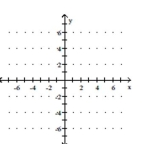
A)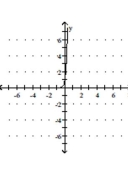
B)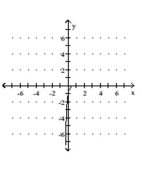
C)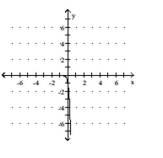
D)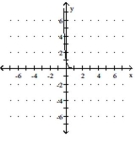

A)

B)

C)

D)

A
3
Graph the function.
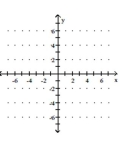
A)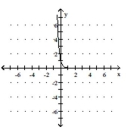
B)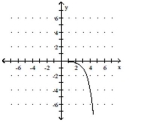
C)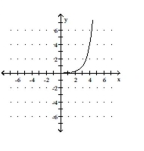
D)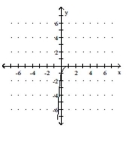

A)

B)

C)

D)

C
4
Graph the function.
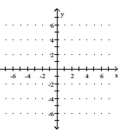
A)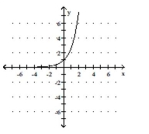
B)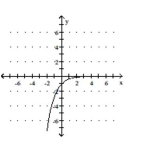
C)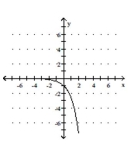
D)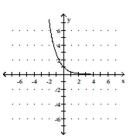

A)

B)

C)

D)


Unlock Deck
Unlock for access to all 79 flashcards in this deck.
Unlock Deck
k this deck
5
Graph the function.
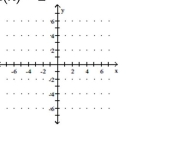
A)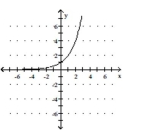
B)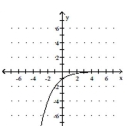
C)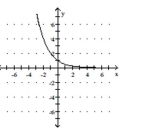
D)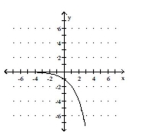

A)

B)

C)

D)


Unlock Deck
Unlock for access to all 79 flashcards in this deck.
Unlock Deck
k this deck
6
Graph the function.
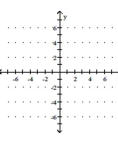
A)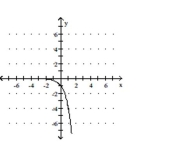
B)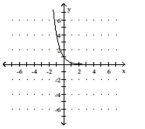
C)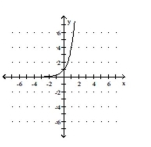
D)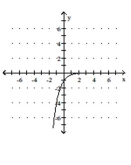

A)

B)

C)

D)


Unlock Deck
Unlock for access to all 79 flashcards in this deck.
Unlock Deck
k this deck
7
Solve for x.
How much money will Lyle have in 6 years is he invests at annual rate of interest compounded quarterly? How much will he have if it is compounded monthly? Use the interest formula . Round the answers to the nearest cent.
A) when compounded quarterly
when compounded monthly
B) when compounded quarterly
when compounded monthly
C) when compounded quarterly
when compounded monthly
D) when compounded quarterly
when compounded monthly
How much money will Lyle have in 6 years is he invests at annual rate of interest compounded quarterly? How much will he have if it is compounded monthly? Use the interest formula . Round the answers to the nearest cent.
A) when compounded quarterly
when compounded monthly
B) when compounded quarterly
when compounded monthly
C) when compounded quarterly
when compounded monthly
D) when compounded quarterly
when compounded monthly

Unlock Deck
Unlock for access to all 79 flashcards in this deck.
Unlock Deck
k this deck
8
Graph the function.
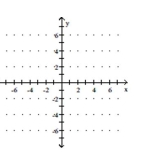
A)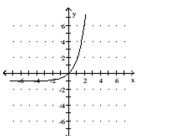
B)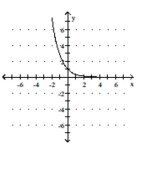
C)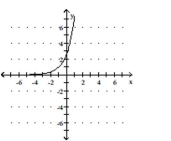
D)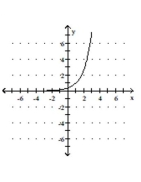

A)

B)

C)

D)


Unlock Deck
Unlock for access to all 79 flashcards in this deck.
Unlock Deck
k this deck
9
Solve for x.
A)
B)
C)
D)
A)
B)
C)
D)

Unlock Deck
Unlock for access to all 79 flashcards in this deck.
Unlock Deck
k this deck
10
Solve for x.
A)
B)
C)
D)
A)
B)
C)
D)

Unlock Deck
Unlock for access to all 79 flashcards in this deck.
Unlock Deck
k this deck
11
Solve for x.
Mary is investing at an annual rate of compounded annually. How much money will Mary have after 6 years? Use the interest formula . Round the answer to the nearest cent.
B)
C)
D)
Mary is investing at an annual rate of compounded annually. How much money will Mary have after 6 years? Use the interest formula . Round the answer to the nearest cent.
B)
C)
D)

Unlock Deck
Unlock for access to all 79 flashcards in this deck.
Unlock Deck
k this deck
12
Solve for x.
A)
B)
C)
D)
A)
B)
C)
D)

Unlock Deck
Unlock for access to all 79 flashcards in this deck.
Unlock Deck
k this deck
13
Solve for x.
A)
B)
C)
D)
A)
B)
C)
D)

Unlock Deck
Unlock for access to all 79 flashcards in this deck.
Unlock Deck
k this deck
14
Graph the function.
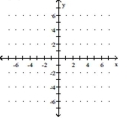
A)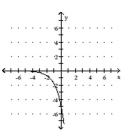
B)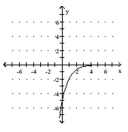
C)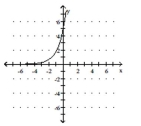
D)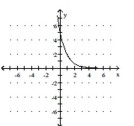

A)

B)

C)

D)


Unlock Deck
Unlock for access to all 79 flashcards in this deck.
Unlock Deck
k this deck
15
Solve for x.
A)
B)
C)
D)
A)
B)
C)
D)

Unlock Deck
Unlock for access to all 79 flashcards in this deck.
Unlock Deck
k this deck
16
Solve for x.
A)
B)
C)
D)
A)
B)
C)
D)

Unlock Deck
Unlock for access to all 79 flashcards in this deck.
Unlock Deck
k this deck
17
Solve for x.
A)
B)
C)
D)
A)
B)
C)
D)

Unlock Deck
Unlock for access to all 79 flashcards in this deck.
Unlock Deck
k this deck
18
Graph the function.
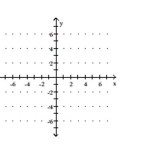
A)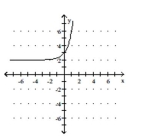
B)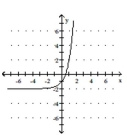
C)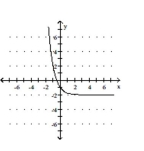
D)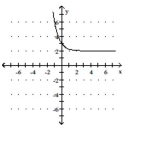

A)

B)

C)

D)


Unlock Deck
Unlock for access to all 79 flashcards in this deck.
Unlock Deck
k this deck
19
Solve for x.
A)
B)
C)
D)
A)
B)
C)
D)

Unlock Deck
Unlock for access to all 79 flashcards in this deck.
Unlock Deck
k this deck
20
Solve for x.
The number of bacteria in a culture is given by , where is the time in hours. How many bacteria will grow in the culture in the first 8 hours?
A)
B) 224,000
C) 128,000
D) 80,000
The number of bacteria in a culture is given by , where is the time in hours. How many bacteria will grow in the culture in the first 8 hours?
A)
B) 224,000
C) 128,000
D) 80,000

Unlock Deck
Unlock for access to all 79 flashcards in this deck.
Unlock Deck
k this deck
21
Solve for x.
The radioactive decay of radon 222 can be described by the equation , where is the original amount of radon and is the amount of radon after days. If milligrams are in a laboratory container today, how much was there is the container 11 days ago? Round to the nearest hundredth.
A)
B)
C)
D)
The radioactive decay of radon 222 can be described by the equation , where is the original amount of radon and is the amount of radon after days. If milligrams are in a laboratory container today, how much was there is the container 11 days ago? Round to the nearest hundredth.
A)
B)
C)
D)

Unlock Deck
Unlock for access to all 79 flashcards in this deck.
Unlock Deck
k this deck
22
Solve.
A)
B)
D)
A)
B)
D)

Unlock Deck
Unlock for access to all 79 flashcards in this deck.
Unlock Deck
k this deck
23
Write in exponential form.
A)
B)
C)
D)
A)
B)
C)
D)

Unlock Deck
Unlock for access to all 79 flashcards in this deck.
Unlock Deck
k this deck
24
Write in exponential form.
A)
B)
C)
D)
A)
B)
C)
D)

Unlock Deck
Unlock for access to all 79 flashcards in this deck.
Unlock Deck
k this deck
25
Write in logarithmic form.
A)
B)
C)
D)
A)
B)
C)
D)

Unlock Deck
Unlock for access to all 79 flashcards in this deck.
Unlock Deck
k this deck
26
Write in logarithmic form.
A)
B)
C)
D)
A)
B)
C)
D)

Unlock Deck
Unlock for access to all 79 flashcards in this deck.
Unlock Deck
k this deck
27
Write in logarithmic form.
A)
B)
C)
D)
A)
B)
C)
D)

Unlock Deck
Unlock for access to all 79 flashcards in this deck.
Unlock Deck
k this deck
28
Write in logarithmic form.
A)
B)
C)
D)
A)
B)
C)
D)

Unlock Deck
Unlock for access to all 79 flashcards in this deck.
Unlock Deck
k this deck
29
Write in exponential form.
A)
B)
C)
D)
A)
B)
C)
D)

Unlock Deck
Unlock for access to all 79 flashcards in this deck.
Unlock Deck
k this deck
30
Write in logarithmic form.
A)
B)
C)
D)
A)
B)
C)
D)

Unlock Deck
Unlock for access to all 79 flashcards in this deck.
Unlock Deck
k this deck
31
Write in exponential form.
A)
B)
C)
D)
A)
B)
C)
D)

Unlock Deck
Unlock for access to all 79 flashcards in this deck.
Unlock Deck
k this deck
32
Solve for x.
A) 402
B) 428
C) 415
D) 408
A) 402
B) 428
C) 415
D) 408

Unlock Deck
Unlock for access to all 79 flashcards in this deck.
Unlock Deck
k this deck
33
Solve for x.
The rabbit population in a forest area grows at the rate of 7% monthly. If there are 180 rabbits in September, find how many rabbits (rounded to the nearest whole number)should be expected by next September. Use The radioactive decay of radium 226 can be described by the equation , where is the original amount of radium and is the amount of radium remaining after years. If 22 milligrams of radium are sealed in a container now, how much radium will be in the container after 100 years. Round to the nearest thousand th.
A)
B)
C)
D)
The rabbit population in a forest area grows at the rate of 7% monthly. If there are 180 rabbits in September, find how many rabbits (rounded to the nearest whole number)should be expected by next September. Use The radioactive decay of radium 226 can be described by the equation , where is the original amount of radium and is the amount of radium remaining after years. If 22 milligrams of radium are sealed in a container now, how much radium will be in the container after 100 years. Round to the nearest thousand th.
A)
B)
C)
D)

Unlock Deck
Unlock for access to all 79 flashcards in this deck.
Unlock Deck
k this deck
34
Write in exponential form.
A)
B)
C)
D)
A)
B)
C)
D)

Unlock Deck
Unlock for access to all 79 flashcards in this deck.
Unlock Deck
k this deck
35
Write in exponential form.
A)
B)
C)
D)
A)
B)
C)
D)

Unlock Deck
Unlock for access to all 79 flashcards in this deck.
Unlock Deck
k this deck
36
Solve for x.
A city is growing at the rate of annually. If there were residents in the city in 2008 , find how many (to the nearest ten-thousand) are living in that city in 2012 . Use .
A)
B)
C)
D) 170,000
A city is growing at the rate of annually. If there were residents in the city in 2008 , find how many (to the nearest ten-thousand) are living in that city in 2012 . Use .
A)
B)
C)
D) 170,000

Unlock Deck
Unlock for access to all 79 flashcards in this deck.
Unlock Deck
k this deck
37
Write in exponential form.
A)
B)
C)
D)
A)
B)
C)
D)

Unlock Deck
Unlock for access to all 79 flashcards in this deck.
Unlock Deck
k this deck
38
Write in logarithmic form.
A)
B)
C)
D)
A)
B)
C)
D)

Unlock Deck
Unlock for access to all 79 flashcards in this deck.
Unlock Deck
k this deck
39
Write in logarithmic form.
A)
B)
C)
D)
A)
B)
C)
D)

Unlock Deck
Unlock for access to all 79 flashcards in this deck.
Unlock Deck
k this deck
40
Write in exponential form.
A)
B)
C)
D) does not exist
A)
B)
C)
D) does not exist

Unlock Deck
Unlock for access to all 79 flashcards in this deck.
Unlock Deck
k this deck
41
Evaluate.
A)
B)
C)
D)
A)
B)
C)
D)

Unlock Deck
Unlock for access to all 79 flashcards in this deck.
Unlock Deck
k this deck
42
Solve.
A)
B)
C)
D)
A)
B)
C)
D)

Unlock Deck
Unlock for access to all 79 flashcards in this deck.
Unlock Deck
k this deck
43
Evaluate.
A)
B)
C)
D)
A)
B)
C)
D)

Unlock Deck
Unlock for access to all 79 flashcards in this deck.
Unlock Deck
k this deck
44
Evaluate.
A)
B)
C)
D)
A)
B)
C)
D)

Unlock Deck
Unlock for access to all 79 flashcards in this deck.
Unlock Deck
k this deck
45
Evaluate.
A)
B)
C)
D)
A)
B)
C)
D)

Unlock Deck
Unlock for access to all 79 flashcards in this deck.
Unlock Deck
k this deck
46
Solve.
A)
B)
C)
D)
A)
B)
C)
D)

Unlock Deck
Unlock for access to all 79 flashcards in this deck.
Unlock Deck
k this deck
47
Evaluate.
A)
B)
C)
D)
A)
B)
C)
D)

Unlock Deck
Unlock for access to all 79 flashcards in this deck.
Unlock Deck
k this deck
48
Solve.
A)
B)
C)
D)
A)
B)
C)
D)

Unlock Deck
Unlock for access to all 79 flashcards in this deck.
Unlock Deck
k this deck
49
Solve.
A)
B)
C)
D)
A)
B)
C)
D)

Unlock Deck
Unlock for access to all 79 flashcards in this deck.
Unlock Deck
k this deck
50
Solve.
A)
B)
C)
D)
A)
B)
C)
D)

Unlock Deck
Unlock for access to all 79 flashcards in this deck.
Unlock Deck
k this deck
51
Evaluate.
A)
B)
C)
D)
A)
B)
C)
D)

Unlock Deck
Unlock for access to all 79 flashcards in this deck.
Unlock Deck
k this deck
52
Evaluate.
A)
B)
C)
D)
A)
B)
C)
D)

Unlock Deck
Unlock for access to all 79 flashcards in this deck.
Unlock Deck
k this deck
53
Evaluate.
A)
B)
C)
D)
A)
B)
C)
D)

Unlock Deck
Unlock for access to all 79 flashcards in this deck.
Unlock Deck
k this deck
54
Graph.
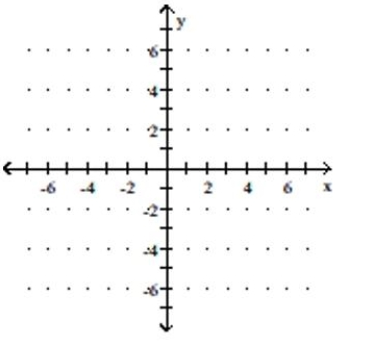
A)
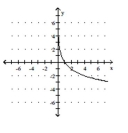
B)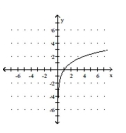
C)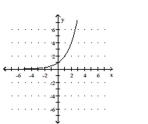
D)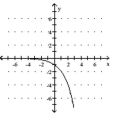

A)

B)

C)

D)


Unlock Deck
Unlock for access to all 79 flashcards in this deck.
Unlock Deck
k this deck
55
Evaluate.
A)
B)
C)
D)
A)
B)
C)
D)

Unlock Deck
Unlock for access to all 79 flashcards in this deck.
Unlock Deck
k this deck
56
Solve.
A)
B)
C)
D)
A)
B)
C)
D)

Unlock Deck
Unlock for access to all 79 flashcards in this deck.
Unlock Deck
k this deck
57
Solve.
A)
B)
C)
D)
A)
B)
C)
D)

Unlock Deck
Unlock for access to all 79 flashcards in this deck.
Unlock Deck
k this deck
58
Evaluate.
A)
B)
C)
D)
A)
B)
C)
D)

Unlock Deck
Unlock for access to all 79 flashcards in this deck.
Unlock Deck
k this deck
59
Solve.
A)
B)
C)
D)
A)
B)
C)
D)

Unlock Deck
Unlock for access to all 79 flashcards in this deck.
Unlock Deck
k this deck
60
Solve.
A)
B)
C)
D)
A)
B)
C)
D)

Unlock Deck
Unlock for access to all 79 flashcards in this deck.
Unlock Deck
k this deck
61
Write the expression as the sum or difference of single logarithms.
A)
B)
C)
D)
A)
B)
C)
D)

Unlock Deck
Unlock for access to all 79 flashcards in this deck.
Unlock Deck
k this deck
62
Graph.
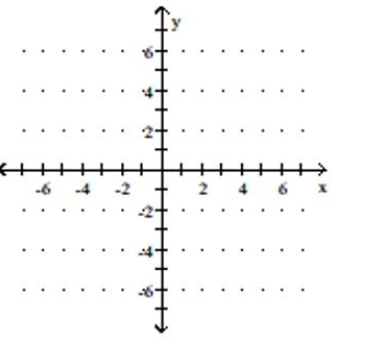 A)
A)
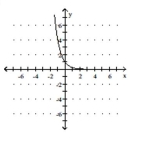
B)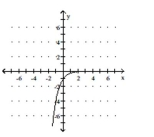
C)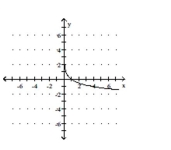
D)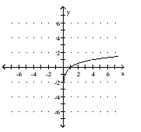
 A)
A)
B)

C)

D)


Unlock Deck
Unlock for access to all 79 flashcards in this deck.
Unlock Deck
k this deck
63
A solution is an acid if its pH is less than 7 and a base if its pH is greater than 7. The pH is defined by pH = -log10[H+],
where [H+] is the concentration of hydrogen ions in the solution. Use this information to answer the question
The concentration of hydrogen ions in a solution is approximately . What is the pH of the solution? Is the solution an acid or a base?
A) The is 9.7. The solution is a base.
B) The is 9.7. The solution is an acid.
C) The is . The solution is a base.
D) The is . The solution is an acid.
where [H+] is the concentration of hydrogen ions in the solution. Use this information to answer the question
The concentration of hydrogen ions in a solution is approximately . What is the pH of the solution? Is the solution an acid or a base?
A) The is 9.7. The solution is a base.
B) The is 9.7. The solution is an acid.
C) The is . The solution is a base.
D) The is . The solution is an acid.

Unlock Deck
Unlock for access to all 79 flashcards in this deck.
Unlock Deck
k this deck
64
Express as a sum of logarithms.
A)
B)
C)
D)
A)
B)
C)
D)

Unlock Deck
Unlock for access to all 79 flashcards in this deck.
Unlock Deck
k this deck
65
Write the expression as the sum or difference of single logarithms.
A)
B)
C)
D)
A)
B)
C)
D)

Unlock Deck
Unlock for access to all 79 flashcards in this deck.
Unlock Deck
k this deck
66
Graph.
On a coordinate plane, graph the function and the function . Then graph a dashed line for the equation
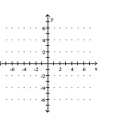 A)
A)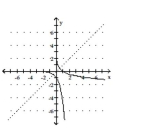
B)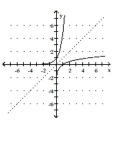
C)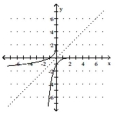
D)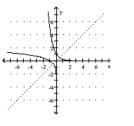
On a coordinate plane, graph the function and the function . Then graph a dashed line for the equation
 A)
A)
B)

C)

D)


Unlock Deck
Unlock for access to all 79 flashcards in this deck.
Unlock Deck
k this deck
67
Write the expression as the sum or difference of single logarithms.
A)
B)
C)
D)
A)
B)
C)
D)

Unlock Deck
Unlock for access to all 79 flashcards in this deck.
Unlock Deck
k this deck
68
Express as a difference of logarithms.
A)
B)
C)
D)
A)
B)
C)
D)

Unlock Deck
Unlock for access to all 79 flashcards in this deck.
Unlock Deck
k this deck
69
Express as a sum of logarithms.
A)
B)
C)
D)
A)
B)
C)
D)

Unlock Deck
Unlock for access to all 79 flashcards in this deck.
Unlock Deck
k this deck
70
A solution is an acid if its pH is less than 7 and a base if its pH is greater than 7. The pH is defined by pH = -log10[H+],
where [H+] is the concentration of hydrogen ions in the solution. Use this information to answer the question
The concentration of hydrogen ions in a solution is approximately . What is the pH of the solution? Is the solution an acid or a base?
A) The is 6.1. The solution is an acid.
B) The pH is 6.1. The solution is a base.
C) The is -6.1. The solution is a base.
D) The is -6.1. The solution is an acid.
where [H+] is the concentration of hydrogen ions in the solution. Use this information to answer the question
The concentration of hydrogen ions in a solution is approximately . What is the pH of the solution? Is the solution an acid or a base?
A) The is 6.1. The solution is an acid.
B) The pH is 6.1. The solution is a base.
C) The is -6.1. The solution is a base.
D) The is -6.1. The solution is an acid.

Unlock Deck
Unlock for access to all 79 flashcards in this deck.
Unlock Deck
k this deck
71
Express as a difference of logarithms.
A)
B)
C)
D)
A)
B)
C)
D)

Unlock Deck
Unlock for access to all 79 flashcards in this deck.
Unlock Deck
k this deck
72
A solution is an acid if its pH is less than 7 and a base if its pH is greater than 7. The pH is defined by pH = -log10[H+],
where [H+] is the concentration of hydrogen ions in the solution. Use this information to answer the question
A mixture has a pH of . Find the concentration of hydrogen ions in the mixture. Is the mixture an acid or a base?
A) , base
B) , acid
C) , acid
D) , base
where [H+] is the concentration of hydrogen ions in the solution. Use this information to answer the question
A mixture has a pH of . Find the concentration of hydrogen ions in the mixture. Is the mixture an acid or a base?
A) , base
B) , acid
C) , acid
D) , base

Unlock Deck
Unlock for access to all 79 flashcards in this deck.
Unlock Deck
k this deck
73
Express as a product.
A)
B)
C)
D)
A)
B)
C)
D)

Unlock Deck
Unlock for access to all 79 flashcards in this deck.
Unlock Deck
k this deck
74
Express as a product.
A)
B)
C)
D)
A)
B)
C)
D)

Unlock Deck
Unlock for access to all 79 flashcards in this deck.
Unlock Deck
k this deck
75
Express as a sum of logarithms.
A)
B)
C)
D)
A)
B)
C)
D)

Unlock Deck
Unlock for access to all 79 flashcards in this deck.
Unlock Deck
k this deck
76
A solution is an acid if its pH is less than 7 and a base if its pH is greater than 7. The pH is defined by pH = -log10[H+],
where [H+] is the concentration of hydrogen ions in the solution. Use this information to answer the question
A mixture has a pH of 7.6. Find the concentration of hydrogen ions [ in the mixture. Is the mixture an acid or a base?
A) , base
B) , base
C) , acid
D) , acid
where [H+] is the concentration of hydrogen ions in the solution. Use this information to answer the question
A mixture has a pH of 7.6. Find the concentration of hydrogen ions [ in the mixture. Is the mixture an acid or a base?
A) , base
B) , base
C) , acid
D) , acid

Unlock Deck
Unlock for access to all 79 flashcards in this deck.
Unlock Deck
k this deck
77
Write the expression as the sum or difference of single logarithms.
A)
B)
C)
D)
A)
B)
C)
D)

Unlock Deck
Unlock for access to all 79 flashcards in this deck.
Unlock Deck
k this deck
78
Express as a product.
A) B
B)
C)
D)
A) B
B)
C)
D)

Unlock Deck
Unlock for access to all 79 flashcards in this deck.
Unlock Deck
k this deck
79
Express as a difference of logarithms.
A)
B)
C)
D)
A)
B)
C)
D)

Unlock Deck
Unlock for access to all 79 flashcards in this deck.
Unlock Deck
k this deck


